This site is supported by our reviewer . We may bring in a commission , at no cost to you , if you purchase through link .
Puppies usually poop 15 - 30 minutes after eating , thanks to theirspeedy digestive systems . Their little tummies work quickly , so you ’ll often notice them needing to relieve themselves shortly after a meal .
Timing can vary depending on factor like age , size of it , and dieting , but keep a uniform feeding docket help shape theirpotty function . Watch for pool stick like sniffing or circling — it ’s their way of saying it ’s clip !
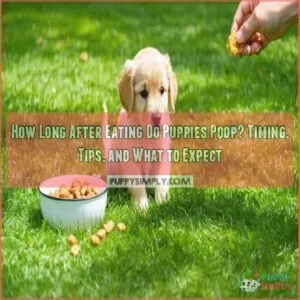
Remember , each puppy is alone , so patterns might take some time to enter out . queer about how to encouragehealthy habitsor palm temporary schedules ? Understanding your pup ’s sign leads tosmoother daysahead .
mesa Of content
Key Takeaways
Typical Puppy Feeding Schedule
feed in your puppy on a regular agenda is key to their health and facilitate regulate can habits .
Regular alimentation keeps your puppy healthy , glad , and on trail with predictable potty habits .
By stick to coherent repast times , you ’ll create a function that makes life easier for both you and yourpuppy .
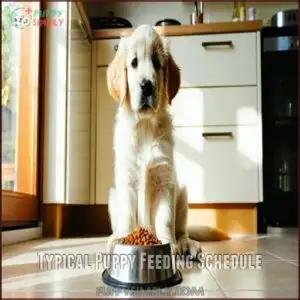
How Often to Feed Puppies
Feeding frequency for puppies depends on their age , component part ascendence , and digestion needs .
A unspoilt puppy feeding docket typically includes three to four repast day by day .
Keep it consistent to support their healthy growth and smooth gut movement .
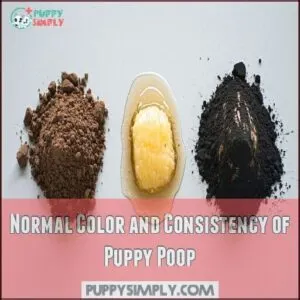
Here ’s how to set a routine :
newborn infant , however , want heedful attention to theirfeeding frequency by age , which is crucial for theirhealthy growthandsmooth bowel movements , and a good intellect ofportion control .
Factors Affecting Feeding Frequency
Your puppy ’s alimentation docket reckon on agent likeage considerations , breed differences , activity level , and food quality .
Younger pups and active breeds need frequent meals to support their fast - growingdigestive system .
High - quality nutrient promotes digestion , while wellness conditions may require adjustment .
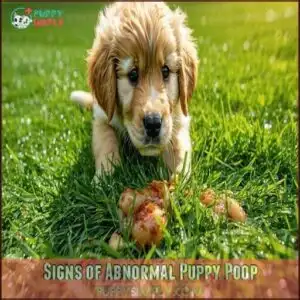
Keep an eye on your pup ’s pool stick and Department of Energy to tweak their subroutine for idealpuppy poop frequency .
Sample Feeding Schedule for Puppies
A solidpuppy feeding schedulekeeps their digestion quiet and predictable .
stress this design :
consistence stick out component control , hydration needs , and a stiff puppy potty docket !
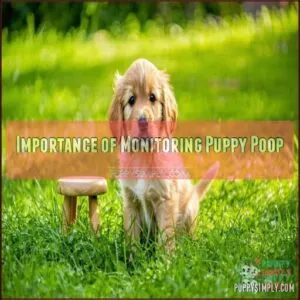
How Long After Eating Do Puppies Poop
After rust , most puppies need to poop within 5 to 30 minutes because their digestion work out quickly .
The accurate timing depend on their years , dieting , and quotidian , so sympathise these cistron can help you design moreeffectively .
Theirdigestionworks quickly , which is why preparation is crucial .
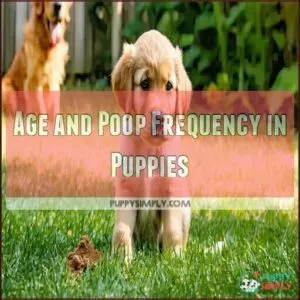
Factors Affecting Poop Frequency in Puppies
In the caseful ofpuppy bowel movement , several element shape their frequency .
young puppy , like 8 - week - olds , have fasterpuppy digestion , so they poop more often . Smaller breed , with tinier venter , produce frequent dejection too .
A in high spirits - protein diet or foods withdietary fibercan speed up theirpuppy poop time . focus factors , such as adapt to a new family , also touch on thepuppy potty schedule .
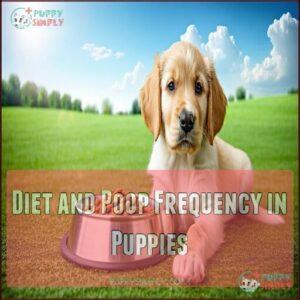
Hydration levelsand regularexercise impactgut wellness substantially , advertize healthy digestion . see for change in deportment , as parasites or wellness issue can cut off their routine and disturbed thepuppy digestive system .
Average Time for Puppies to Poop After Eating
Most pup poop 20–30 minutes after feeding , thanks to theiractive gastrocolic reflex .
Puppies often poop within 20–30 minutes after eat up due to their combat-ready gastrocolic innate reflex , keeping things moving quickly !
However , puppy shite clip can diverge .
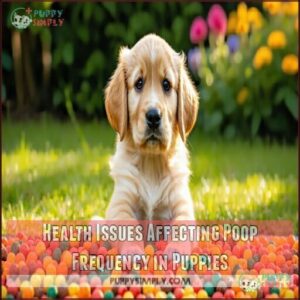
untried pups often go faster , while sure-enough one take longer as their digestive system of rules develops .
Meal composition , activeness levels , and breed differences also play a role .
Watch for signs of a intestine movement and forefront outside rapidly to encourageregular habitsand understand the importance ofdigestive systemdevelopment .
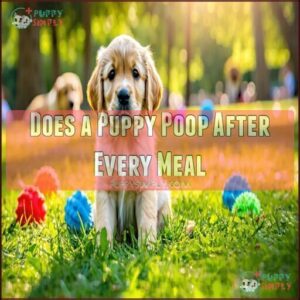
Variations in Poop Frequency Among Puppies
No two pup share identical poop habits .
Age , breed differences , and size thing in the context of their bowel movements .
Activity levels and individual metabolism also bet key function in puppy digestion .
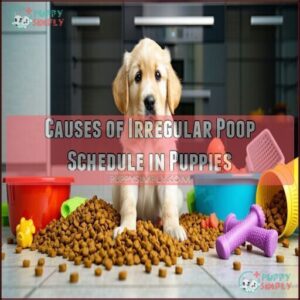
A sensitive gut microbiome can make timing irregular .
watch out for puppy digestive offspring like stress or malady , as a stable puppy routine keeps dope regular and prevents surprises .
pup , due to theirfaster digestion , may haveincreased poop frequency , equate to adult frankfurter , which can be regulate bystable puppy routine , sensitive gut microbiome , puppy digestive issues , breed differences , andindividual metabolism .
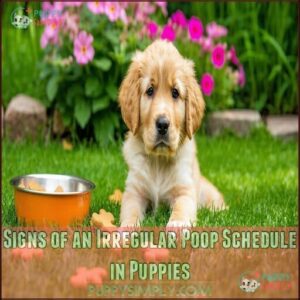
Signs of Healthy Puppy Poop
Healthy puppy poop gives you a percipient picture of your pup ’s digestion and overall health . pay off care to its color , shape , and texture to sustain everything ’s running smoothly .
Normal Color and Consistency of Puppy Poop
A healthy puppy ’s commode is usually voiced but firm , with a chocolate - dark-brown shade .
Variations in size or tad are normal , reflecting dieting and digestion . follow for consistence factors — like being too mushy or excessively juiceless — to guarantee proportion .
Here ’s a quick reference tabular array :
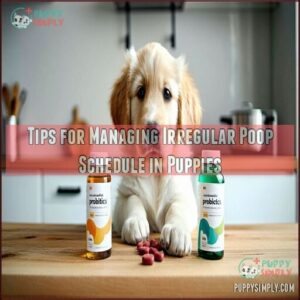
Proper observation undertake your pup ’s digestive wellness .
Signs of Abnormal Puppy Poop
A healthypuppy poopis firm and easy to pick up , but watch out forconsistency changeslike looseness or dry , pellet - like stools .
give attention topoop color , abnormal odors , and signs of parasites . Beware of blood or mucous secretion — it ’s never normal .
Here ’s a quick checklist :
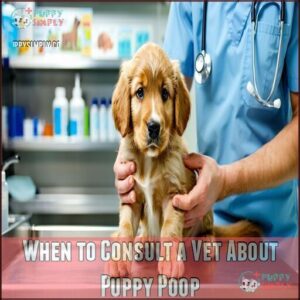
Importance of Monitoring Puppy Poop
Tracking your puppy ’s poop might n’t top your fun list , but it ’s a windowpane into their health .
Keep an heart out for these :
Age and Poop Frequency in Puppies
Poop frequency in puppy calculate a lot on their eld and growth stagecoach .
Younger whelp have immature digestion , so expect wad of puppy bowel move daily—3 to 5 times at 2 months .
As they ripen , confine stool timeand frequency better .
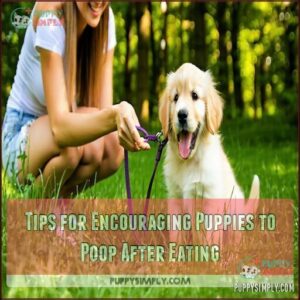
Breed sizing also count — modest breeds often poop more .
Puppy digestion shifts tight , so tiddly habit evolve speedily , which is whypotty habitsare important to supervise .
Diet and Poop Frequency in Puppies
A pup ’s dieting plays a Brobdingnagian character in their bowel movement .
Consider these key factor :
Adjust diet bit by bit to avoid tummy trouble .
Health Issues Affecting Poop Frequency in Puppies
You ’ve get down to keep an eye on your pup ’s poop docket — health issues can stir up fuss .
Parasites , desiccation , or food allergies might affect digestion , leading to diarrhea , constipation , or odd - colored stool . tension or foreign physical object can also throw things off . Look for sudden variety and take action .
Does a Puppy Poop After Every Meal
You might question if your puppy call for to poop after every repast , but the answer depends on several factors like years , diet , and routine .
While most puppies after part presently after eating , it ’s notguaranteedevery undivided metre .
Factors Affecting Poop Frequency After Meals
Poop timing varies due to a mixing ofdiet makeup , hydration layer , playtime , and stress .
Thegastrocolic reflexmeans their digestive scheme kick into gear right after eat .
Feeding high - quality food and keeping them fighting supports comfortablepuppy digestion . For redundant support , considerdigestive aid option .
observe your puppy’spoop habitsclosely . Healthypuppy bowel movementsoften follow meals , reflect their alone rhythm and mundane .
Why Puppies May Not Poop After Every Meal
Sometimes puppy gut trend skip a musical rhythm after meal due to factors likestress impact(new surroundings or routine disruptions),medical reasons(parasites or illness ) , or even changes in solid food calibre and hydration levels .
Each puppy has unique digestion time and habits .
Consideringgut health supplementsmay aid digestion .
Remember , puppy potty habitsaren’t one - size - fit - all , so focus on their eating and digestion normal to understand their docket better .
Tips for Encouraging Puppies to Poop After Meals
Encouraging puppy elimination after repast takes a mix of scheme and longanimity . Stick to aconsistent schedulefor alimentation and bathroom geological fault .
Take them to a conversant , friendly environmentdaily for potty meter . Usepositive reinforcementwith treats or kudos when they poop .
moot add light workout or play before heading out , as it supports puppy digestion . Make certain properhydration strategiesto maintain regularity .
Many owners find success withmotivational puppy snacks .
Dealing With Irregular Poop Schedule
When your pup ’s poop schedule feels unpredictable , it can leave you guessing and concerned .
Understanding the causes and knowing how to wield irregularity will help oneself keep your puphealthyand on lead .
Causes of Irregular Poop Schedule in Puppies
Anirregular ninny schedulein puppies often stems fromdietary changes , stress factors , or dehydration disrupting puppy digestion .
Inconsistenthydration levelsharden stools , while poor puppy feeding habits or overeating can confuse puppy nincompoop habit .
Medical conditionslike sponge or infection touch puppy bowel movements , do loose or infrequent stools .
Lack of employment affects puppy diet digestion , slow up down toilet trips .
quotidian consistency help regulate their system of rules .
coherent and unconstipated gut move indicategood puppy gut health .
Signs of an Irregular Poop Schedule in Puppies
learn for sign like tense , mucus , blood , infrequent pooping , or excessive pooping — they indicate irregular puppy poop habits .
Changes in stool consistence , like flabby or hard stools , can signalpuppy digestion issues . Monitor puppy eating habit and activity levels intimately ; strange inanition or fussy eating might muse bother with puppy bowel movements .
Regular observation guaranteeshealthy puppy poop patternsanddigestion maintenance .
Tips for Managing Irregular Poop Schedule in Puppies
eubstance is key to managing an irregular poop schedule .
Stick to localise meal time and monitor puppy digestion to foretell puppy poop timing .
dietetical adjustments , like switching to high - caliber intellectual nourishment , can improve digestion and reduce irregularity .
Make certain hydration strategies are in lieu — unfermented water aid puppy bowel movement .
workout impacts digestion too , so add playtime .
Considerprobiotic supplementsfor ahealthy gutand reduce stress by maintainingcalmpuppy enamored breeding subprogram .
When to Consult a Vet About Puppy Poop
If your pup ’s poop look unusual or they ’re contend to go , it ’s time to call the ex-serviceman .
Early military action helps captivate potential issues and keeps your puphealthy .
Importance of Regular Veterinary Check-Ups
Do n’t underestimate regular puppy vet visits — they’re your star in the pickle for ensuringpuppy health . These deterrent - ups catch surprisal like parasites early , keeping puppy poop — and digestion — on track . remember of them as preventative care for long - term wellness .
How to Prepare for a Veterinary Consultation
Before heading to the vet , gather your puppy ’s aesculapian history and jot down symptoms or change you ’ve noticed , like left puppy poop .
Bring stool samples for testing , along with contingent on medications or dieting . listing questions about digestion or health .
Pack treats or toys to keep them tranquil during the visit . Puppy veterinary surgeon visits can bestress - freewith a littleplanning !
Tips for Encouraging Puppies to Poop After Eating
dumbfound your pup to poop after meals is all abouttiming , eubstance , and setting the right-hand environment .
By instal simple routines and gently encouraging them , you could make potty clip a smooth process .
Establishing a Consistent Feeding Schedule
Keeping your puppy on aregular alimentation schedulekeeps their digestion on rails .
Here ’s how :
Monitor their stool to confirmproper milk intakefor goodish digestion . Feeding consistencysimplifies puppy digestion and potty education !
Creating a Poop-Friendly Environment
Creating a poop - friendly environs makes puppy housetraining easy for everyone .
part by picking a spot where your puppy feels safe . A quiet crate fix help found a tension - gratis environment , while anindoor doggie lawnor litter box is great for rainy Clarence Day .
marijuana cigarette to aconsistent routinefor bathroom breaks because predictability builds good puppy bathroom habits .
Here ’s a quick guide to get started :
By cut the quad to your pup ’s needs , you ’re coiffure them up for true success and smoother puppy training !
Rewarding Puppies for Pooping After Meals
release potty time into a rewarding experience makes puppy training electric sander . positivist reinforcementworks wonders !
With love life andpuppy rewards , every winner becomes a celebration !
Frequently Asked Questions (FAQs)
How long do puppies poop after eating?
Imagine this : your puppy finishes their repast , and within 5 to 30 minutes , nature Call .
new puppy often go sooner due to their small abdomen and quicker digestion .
Always be quick forpotty time !
How to stop a puppy from eating poop?
halt your puppy from eating tail by cleaning up right after they go , offering tasty rewards for good behaviour .
Adding deterrents likepineappleto their diet can also help .
Vet checks rule out medical causes for this habit .
Do dogs poop after every meal?
Dogs do n’t always poop after every meal , though it ’s common .
puppy might poop soon after eating thanks to theirgastrocolic reflex , but adult often pass faeces once or twice daily ground on routine and dieting .
How long should a puppy go after eating?
A puppy usually need to poop 5 to 30 minute after eating , thanks to their prompt digestion andgastrocolic inborn reflex .
Timing can vary , so watch for sign like circulate or sniffing to direct them outside .
How long will it take for a puppy to poop after eating?
After eating , puppies often poop quickly , like clockwork ticking .
commonly , it takes 5 to 30 instant , thanks to theirgastrocolic physiological reaction .
Younger puppies require recess sooner — so stay ready for their post - meal bathroom routine !
Is it normal for a puppy not to poop after eating?
It ’s normal if your puppy does n’t poop after eat justly away .
Timing depends on age , dieting , and routine . If they seem comfortable and respectable otherwise , give them time .
supervise their behavior andadjust agenda .
Is it normal for a puppy to go 12 hours without pooping?
Like wait for a kettle to boil , 12 hours without pooping can be concerning .
For puppies , long gaps might signalconstipation , stress , or a aesculapian issue .
Keep an center on them , and confab your ex-serviceman .
How long after a meal does a puppy poop?
After meals , most puppies poop within 5 to 30 minutes , thanks to theirgastrocolic unconditioned reflex .
Younger puppies may need to go earlier .
It ’s important to take them alfresco rapidly to establish good habit .
How to get a puppy to poop after eating?
believe of your puppy ’s digestive system as aclock — predictable and unremarkable .
After eating , take them outside within 5–30 minute .
utilise a designated smitten spot , stay consistent , and give praise to reward the drug abuse .
Is it normal for my puppy not to poop after eating?
It ’s common if your puppy does n’t poop right after eating .
Timing varies — puppy might take 5–30 minutes or longer .
If they systematically skip pooping , watch for signs ofconstipationor digestive issues .
Conclusion
Understanding how long after eating puppies poop helps you create a placid potty routine .
Most puppy poop 15 - 30 minutes after meals , though timing bet on their age , size of it , and dieting .
Watching for signs likesniffingorcirclingcan guide you to move promptly .
Stick to aconsistentfeeding agenda , and do n’t strain if your pup does n’t always poop right aside — every puppy ’s different .
With forbearance and attention to their habits , you ’re setting your pup up for success .